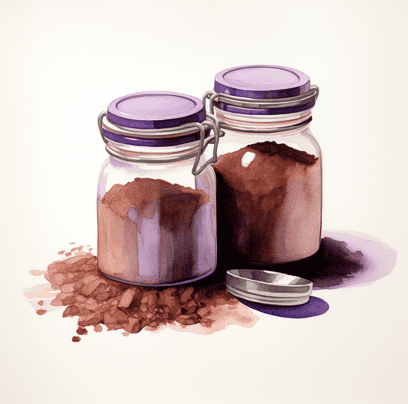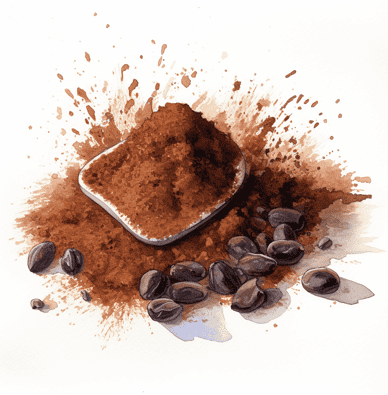
Deciding between carob powder vs cocoa powder can be tricky when you’re aiming to boost your skin health without compromising on taste. If you’re looking to refine your diet with the best choice for health and beauty benefits, you’ll find the answers here.
Hi, I’m Hazel
I gave up on skincare after years of issues with acne and sensitive skin.
But after going plant-based, my skin cleared up and even started to glow. Now I help women reveal their natural beauty with simple, delicious plant-based food.
I also used to be a nurse, and love nerding out on nutritional science (high-quality science, that is).

As usual, this post is based on the strongest nutritional evidence I could find with a focus on the simplest, most delicious foods
…because who has time to waste on anything less?
The quick version:
Carob powder is known for its lower fat and sugar content compared to cocoa powder, making it a healthier alternative for those monitoring their calorie intake. It contains gallic acid, which helps combat oxidative stress beneficial for skin health.
Cocoa powder, on the other hand, offers mood-enhancing properties and a richer source of antioxidants, which can promote better skin health by fighting free radicals.
Carob Powder: A Healthy Alternative?
Carob isn’t just a sweet treat; it’s packed with health bonuses. Let’s dive into what makes carob stand out.

Natural Sweetness Without the Guilt
Carob’s natural sweetness means you can enjoy fewer added sugars in your diet. This is great news for your skin, as high sugar diets can exacerbate skin issues.
Digestive Health and Beyond
Rich in dietary fibre, carob supports good digestion and even acts as a natural laxative without the harsh effects. Its content of gallic acid also helps fight oxidative stress, a known enemy of healthy skin.
Carob in Your Kitchen
Whether it’s a tablespoon of carob powder in your morning smoothie or carob chips in your baking, integrating carob is simple.
It offers a delicious dessert option that’s actually good for you.
Cocoa Powder: Rich in Flavour
Cocoa is still much more than a basic ingredient; it’s a powerhouse of mood-boosting and skin-enhancing properties. Let’s explore what makes cocoa a favourite around the world.

Antioxidants for Radiant Skin
Loaded with antioxidants, cocoa helps to fight off free radicals which are responsible for premature ageing.
Regular consumption can lead to healthier, more youthful skin.
A Mood Enhancer That Tastes Divine
The bitter taste of raw cacao is transformed through the fermentation process into a delicious, deeply satisfying brown powder.
Not only does it elevate your mood, but it also brings richness to a range of dishes, from hot chocolate and milk chocolate delights to even chilli.
Culinary Flexibility for Chocolate Lovers
Whether you’re whipping up some chocolate chips cookies or a luxurious dark chocolate cake, cocoa powder is incredibly versatile.
It’s the perfect chocolate substitute for those who love rich, deep flavours in their desserts.
Carob Powder vs. Cocoa Powder for Health
When it comes to nutritional value and health impacts, here’s how they stack up.

Nutritional Showdown: Fibre and Sugar
Comparing fibre and protein content, carob offers fewer calories and less sugar, making it a compelling choice for weight management and skin health.
Cocoa, with its rich mineral content, provides a robust profile beneficial for overall well-being.
Sweet Benefits with Fewer Worries
Carob’s natural sugar content and sweet pulp make it a safer bet for those looking to reduce their sugar intake without sacrificing taste.
Cocoa’s intense flavours, though more indulgent, are usually associated with more sugar in it’s recipes and blood sugar levels can affect your skin and health.
From Baking to Brewing
Incorporating carob flour and raw carob powder into your recipes is straightforward and beneficial.
Meanwhile, cacao beans and cacao butter offer a wealth of possibilities for creating authentic, flavourful chocolate-based dishes.
Making the right choice between carob and cocoa depends on your health goals, dietary preferences, and taste. Both offer unique advantages that can enhance your beauty routine from the inside out.
Substituting Carob for Cocoa in Recipes
Swapping carob for cocoa in your favourite recipes can be a delightful experiment, but it comes with some considerations.

Understanding the Flavour Profile
Carob has a naturally sweeter and milder taste compared to the bitter taste of cocoa. When substituting, you may need to adjust the amount of sugar in recipes to avoid overly sweet results.
Texture and Consistency Adjustments
Carob and cocoa powders have different textures. Carob tends to be lighter and might not provide the same richness as cocoa. You might want to experiment with proportions to achieve the desired thickness in sauces or batters.
Consider the Health Benefits
Choosing carob over cocoa can decrease the caffeine content in your dishes, making it a better choice for those sensitive to stimulants or looking for a night-time treat. Plus, the lower fat content in carob can be beneficial for those watching their caloric intake.
You may also like:
How to Choose Between Cacao vs Cocoa
Making the Choice: Which Suits You Best?
Knowing your personal and dietary needs can help you make the best choice between carob and cocoa.
For the Health-Conscious Sweet Tooth
If managing your sugar intake is a priority, carob’s lower sugar content and natural sweetness make it an excellent choice.
It’s ideal for those who want to indulge without the guilt.
Rich Flavours for Chocolate Aficionados
For those who can’t resist the allure of rich, indulgent flavours, cocoa provides deep, bitter taste profiles that enhance any chocolate substitute dish, making it a favourite among chocolate lovers.
Carob powder vs Cocoa powder
Whether you lean towards the sweet, health-friendly profile of carob powder or the rich, indulgent nature of cocoa powder, each offers unique benefits that cater to your beauty and health goals. Experiment with both to find which best suits your lifestyle and satisfies your palate in your quest to make the best choice between carob powder vs cocoa powder.
References
Most references below will link to the original peer-reviewed study itself. However, sometimes I will link to a video over at NutritionFacts.org instead, which is by far the single best resource of brutally transparent nutritional evidence you will ever see. Dr Greger tells a great story about the realities of the science and if I think you will benefit more from one of his videos, the link will take you there instead.
Happy nerding!
- Ikram A, Khalid W, Wajeeha Zafar KU, et al. Nutritional, biochemical, and clinical applications of carob: A review. Food Sci Nutr. 2023;11(7):3641-3654. Published 2023 Jun 9. doi:10.1002/fsn3.3367
- Yoon HS, Kim JR, Park GY, et al. Cocoa Flavanol Supplementation Influences Skin Conditions of Photo-Aged Women: A 24-Week Double-Blind, Randomized, Controlled Trial. J Nutr. 2016;146(1):46-50. doi:10.3945/jn.115.217711